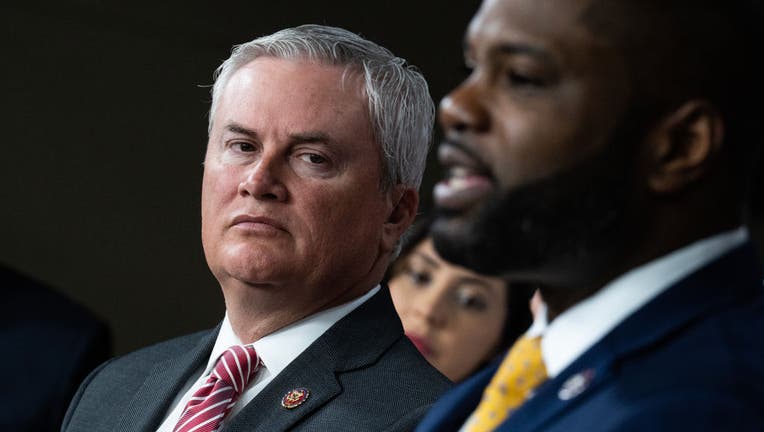DC CRIMES Act passes House, threatening local sentencing reforms

UNITED STATES - MAY 10: Reps. James Comer, R-Ky., left, chairman of the House Oversight and Accountability Committee, and Byron Donalds, R-Fla. (Tom Williams/CQ-Roll Call, Inc via Getty Images)
WASHINGTON - The U.S. House of Representatives passed the D.C. CRIMES Act (HR 7530) on Wednesday afternoon, a move that would limit D.C.'s ability to modify its sentencing laws.
The legislation aims to restrict the D.C. Council's authority and significantly curtail the Youth Rehabilitation Act, which allows judges to impose age-appropriate sentences on individuals aged 18 to 24 and potentially seal their records upon sentence completion to aid in reintegration.
Liz Komar with the Sentencing Reform Counsel with The Sentencing Project, criticized the bill.
"The D.C. CRIMES Act is a profound attack on Home Rule and public safety that would prevent DC lawmakers from increasing or decreasing any criminal penalties," she said.
Komar highlighted that the D.C. Council had recently passed the Secure D.C. Omnibus Amendment Act in early March after extensive debates and community feedback.
Despite criticisms of its severity, Komar believes the Council's action demonstrated a willingness to address constituents' concerns about crime.
According to Komar, the D.C. CRIMES Act would have blocked this local legislative effort entirely.
Komar also argued that the bill's rollbacks to the Youth Rehabilitation Act, which has been shown to reduce repeat offenses, would not enhance public safety.
"Limiting the YRA will not strengthen communities; instead, it will deepen racial disparities and increase incarceration. We urge Senate leadership to ensure that this bill does not advance any further," she added.
House Committee on Oversight and Accountability Chairman James Comer (R-Ky.) praised the bipartisan passage of H.R. 7530.
"The D.C. CRIMES Act will help rein in crime and lawlessness in Washington to restore law and order in our nation’s capital city. All Americans deserve to feel safe in their nation’s capital, and today’s passage of Rep. Byron Donalds’ bill is a step in the right direction," Comer said.
The House Committee on Oversight and Accountability views this action as part of its constitutional duty to oversee the governance of the District of Columbia.
The D.C. CRIMES ACT still has to pass the Senate and be signed by President Joe Biden to become official.
Earlier this week, the White House released a Statement of Administration Policy saying, "The [Biden] Administration strongly opposes H.R. 7530, the D.C. Criminal Reforms to Immediately Make Everyone Safe (D.C. CRIMES) Act of 2024, which would prevent the District of Columbia from increasing criminal penalties. Earlier this year, the District enacted the Secure D.C. Act, with the Mayor’s strong support and no opposition in the D.C. Council, which gave police and prosecutors new tools – including increased penalties – to address gun violence and carjackings. Had the D.C. CRIMES Act of 2024 been enacted at the time, it would have blocked the District’s increases to criminal penalties. The D.C. CRIMES Act of 2024 is a counterproductive and destructive invasion of the District’s right to self-governance and would impede public safety and crime reduction. This bill highlights why the District of Columbia should have statehood."



